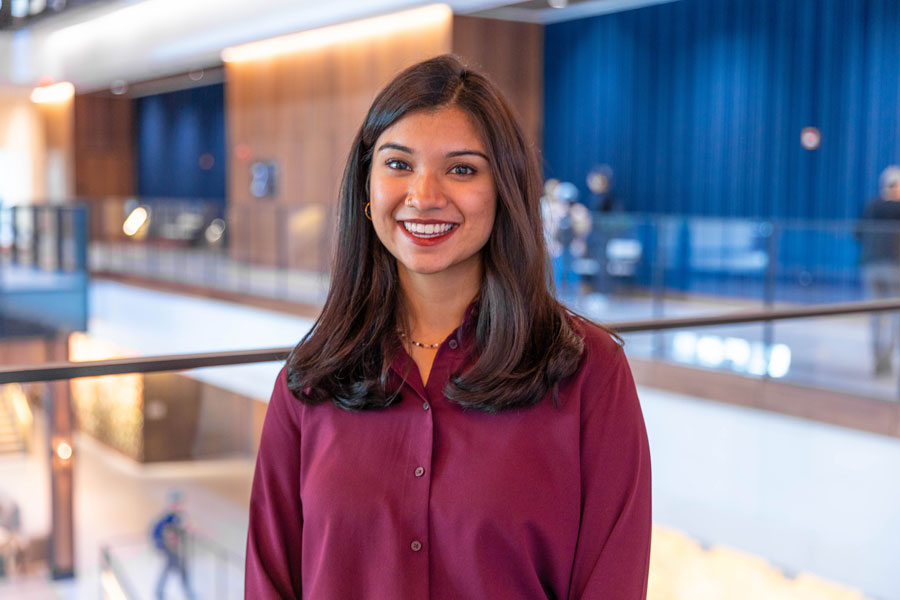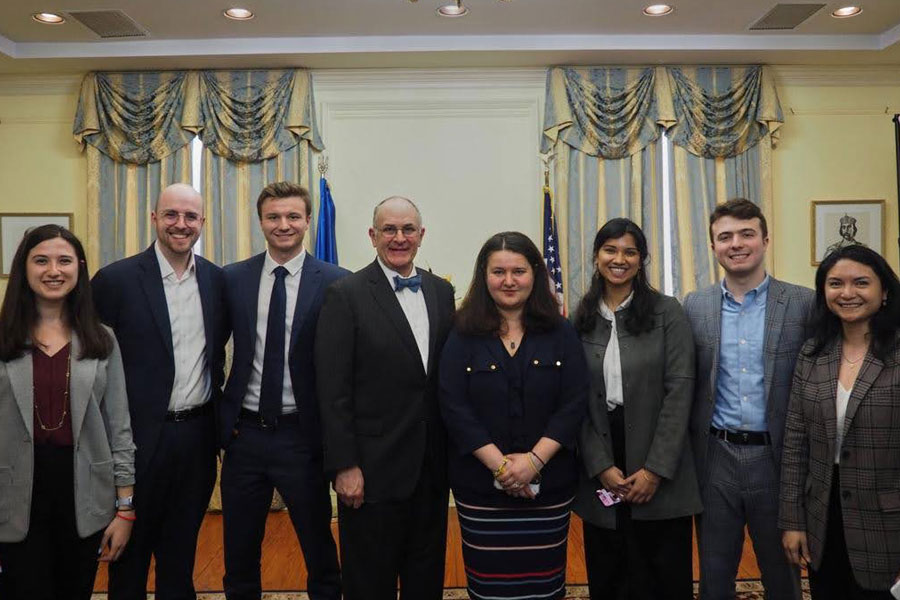Fostering Both Passions and Careers

Name: Aditi Mahesh
Home Countries: The U.S., Singapore, and India
Degree: Master of Arts in International Relations
Scholarship: Harvey M. & Lyn P. Meyerhoff Fellowship
Before joining the Johns Hopkins School of Advanced International Studies (SAIS), what were you doing?
Born in Seattle and raised primarily in Mumbai and Singapore, my international upbringing led me to pursue international relations.Before joining SAIS, I was a defense consultant in the Office of Secretary Defense Policy where I observed the intersection of diplomacy and security. I learned how to interact with different stakeholders all representing different interests, and assisted them in collaborating with each other on shared irregular warfare priorities.
I also interned at the State Department’s Bureau of Intelligence in Research with the Near East and South Asia team where I observed the intelligence cycle in action, and understood how to become both a powerful creator and consumer of intelligence. This internship allowed me to apply my regional South Asia interest beyond the walls of the classroom.
SAIS’ faculty have fostered my passion for the South Asian region and set me up with robust tools for a career.
What led you to Johns Hopkins SAIS?
My crude introduction to geopolitics began at a young age in 2008 when I watched terrorists overtake my city of residence, Mumbai, on Nov. 26. Although I was young, this formative experience went on to color my academic interests, and pushed me into the world of South Asian geopolitics. I knew early on that I wanted to pursue international relations, both in my undergraduate and graduate studies.Of the schools that I was choosing between, I was drawn to SAIS’ comprehensive South Asian studies faculty, and having taken South Asia classes here, I can confidently say I made the right choice. Between Professor Devesh Kapur and Professor Joshua White, the academic and professional opportunities for a career in South Asia policy are comprehensive. SAIS’ faculty have fostered my passion for the South Asian region and set me up with robust tools for a career.

What has been your favorite experience at SAIS and why?
In the spring of last year, the SAIS Careers in Diplomacy club visited the Ukrainian Embassy to engage in a powerful discussion with the Ukrainian Ambassador to the United States. We bore witness and engaged in a lively academic, yet deeply emotional, interaction. We heard firsthand the complexity of what it meant to be a diplomat when your country is being invaded. This was one of the most unforgettable moments of my life, let alone my career.What do you plan on pursuing after graduation?
Through both my academic, professional, and cultural experiences, I aspire to bring a greater understanding of South Asia to the larger American foreign policy community and strengthen diplomacy.Cultural sensitivity plays a crucial role in successful diplomacy. It involves acknowledging the differences in cultural norms, values, and behaviors between nations. In an era of globalization and interconnectedness, diplomacy and cultural sensitivity are not optional; they are imperative. By understanding these nuances, diplomats and policymakers can avoid missteps that could hinder international relations. I aim to do exactly this through my work at the Department of State.
What is one piece of advice you would give to students in the process of choosing graduate schools?
Pick a school whose faculty speaks to you. Understand your academic and professional goals, and seek faculty mentors that can assist you in reaching your destination.This was the most important piece of advice I was given, and it hasn’t led me astray!
I chose SAIS to learn from my fellow peers — who are activists, scholars, refugees, public servants, and experts — as much as SAIS’ world-renowned faculty.
What was one of the things you learned during your time at SAIS that transformed your perspective or way of thinking?
I chose SAIS to learn from my fellow peers — who are activists, scholars, refugees, public servants, and experts — as much as SAIS’ world-renowned faculty.Last semester, I had the joy of working with and learning from David Smolansky, former Mayor of El Hatillo Municipality in Venezuela, a Venezuelan opposition activist, and political refugee. In our International Migration, Diasporas, and Development class, David, along with the rest of our group, talked about the multilateral efforts in place to help Venezuelan refugees. As a Venezuelan refugee himself, he shared with us powerful personal anecdotes, as well as his work with the Organization of American States, through which we learned the dire conditions Venezuelan refugees face as they escape.
If you are looking to learn more about what it's like to be a current student at Johns Hopkins SAIS, we encourage you to schedule a virtual appointment with one of our Admissions Fellows.
Enjoyed reading Aditi's experience? Learn more about our Master of Arts in International Relations.
Back to Student Stories